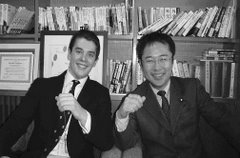
The
blogosphere and international media have been buzzing with righteous indignation recently, following the discovery of an overtly racist magazine,
Gaijin Hanzai Ura Fairu ('Hidden Files of Crimes by Foreigners'), in Japanese book shops and convenience stores. The story was picked up by the online community, who called for a boycott on establishments which sold the publication, and an
article in the British Guardian newspaper followed. A well-known naturalised-Japanese Human Rights activist,
Arudou Debito, also published an
extensive online critique of the magazine in English.
One of the many elements to which protesters objected was the line, "
Oi Nigger!! Get your fuckin’ hands off that Japanese lady’s ass!!" Although many pointed out the magazine was xenophobic, racist, and clearly whipping-up racial hatred by portraying Japan's foreigner community as criminals, there is no law against incitement to racial hatred in Japan and the vernacular press remained curiously silent.
At a juncture in Japanese history when a substantial increase in immigration--and therefore 'foreign-looking' residents--is almost unavoidable due to the pressures of a rapidly aging society and the economic need for a workforce, this magazine is clearly neither going to prepare the Japanese people for an immigration boom, nor inspire foreign nationals to emigrate.In the summer of 2005, the UN Special Envoy, Doudou Diène, reported that racism in Japan was "deep and profound," and urged legislation (which does not currently exist) to combat it. [David McNeill's excellent article for Japan Focus on the 'Diène Report' can be read here] The Japanese reaction was indignation. How, many said, could a man with so little experience of Japan fully comprehend the subtleties of Japanese society?Top-level politicians have recently been campaigning for an end to
ijime ('bullying') in schools, after a spate of suicides which were allegedly caused by victimisation meted out by teachers. Just as bullying comes in a thousand different shades--it is not merely limited to physical violence--so too does racism extend beyond apartheid measures and racially-motivated attacks. The excuse for signs such as that pictured above is often linguistic. "We do not currently have staff with the necessary language skills," is often the reply to probing inquiries. Yet, a Japanese-looking man without vocal cords would be welcomed despite the inability to speak, perhaps ordering by pointing. An absence of staff proficient in sign-language would not trigger a prohibition on the dumb. Likewise, linguistic inability is no excuse for imposing a blanket-ban on anyone who appears non-Asian.
But the manifestations of Japanese racism are not always immediately obvious. There are cases of black African men being refused entry to shops and Caucasians barred from entry to bath houses, but the racism generally encountered is of a quieter variety. Some may look away when a mentally-handicapped person walks onto the bus, worried that staring may seem rude. In Japan, this is often the case with those who look foreign. Of course, travel outside Tokyo and the screams of school-girl adulation generally follow a Caucasian-foreigner around like fleas, but more often people look the other way, fearful of causing offense.
But is this really intentional racism? Probably not. Most Japanese have had limited interaction with foreigners (be they Caucasian, Black, Asian or otherwise), and unease is really built on foundations of ignorance. Whilst there are the more right-wing members of the population, such as those that produced the
Gaijin Hanzai Ura Fairu publication, most have just not had the international experience to encourage a more globally-cosmopolitan outlook.
So it is not all doom and gloom. Not all Japanese are eternally xenophobic; many are just unsure of how to react to non-Japanese strangers. However, one thing is for sure: The current policy of ignoring the issues of crime, poor education and poverty in resident foreigner communities cannot improve Japan's chances of producing adept immigration policies in the future. However misguided the recent magazine was, when its editor,
Saka Shigeki, said "only by honestly discussing this issue and all it entails can we prepare our culture for this [increased immigration] radical change," he hit the nail on the head. Frank discussion
is needed. The debate currently underway in the UK about the values of multiculturalism should have its
bedmate here in Japan too. What is
not needed, however, are examples of misleading and
racist material, such as
Gaijin Hanzai Ura Fairu.
R J F
Villar









